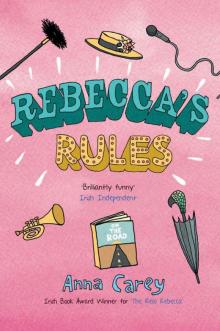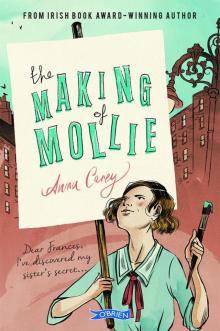- Home
- Anna Carey
The Boldness of Betty Page 4
The Boldness of Betty Read online
Page 4
‘My ma makes dresses for Mrs Lawlor,’ I said. ‘But I swear, I didn’t know she was doing me any favours. I didn’t ask for it or anything. I didn’t even know.’ To my horror, I felt tears come to my eyes. It was bad enough leaving school and having to go out to work. I couldn’t bear the thought of everyone here hating me because I’d cheated my way up the Lawlor’s ladder.
Rosie just grinned at me, which shows what a nice nature she has, because if I’d just spent a year washing dishes in a boiling hot steamy room with my fingers going all red and the skin practically falling off because of being stuck in hot water all day, I’m not sure I’d be feeling so generous towards someone who had just swanned in and got a job selling cakes straight away.
‘I believe you, thousands wouldn’t,’ she said. ‘Janey, you’re not going to start crying, are you?’
‘No!’ I said. Clearly starting my first ever job was making me sentimental. ‘I just … I didn’t want to cheat.’
I threw my shoulders back and looked at Rosie as bravely as I could.
‘I’ll go and tell Miss … Warby. Is that the manager’s name?’ I said. ‘I’ll tell her I want to work in the washing-up room.’
‘Are you mad?’ Rosie stared at me. ‘You wouldn’t get me back in that room for a hundred pounds. Solidarity’s one thing, but there’s no point being a martyr. Just work at the counter and count your blessings. And share your closing cakes with the washing-up girls.’
‘What do you mean, closing cakes?’
‘At the end of the day, the shop girls usually each get some buns or cakes, depending on what’s left over,’ said Rosie. ‘I always take one home to my little brother. You can share some of yours with the sink room.’
No sooner had Rosie given me this good advice than there was the sound of firm footsteps in the corridor, and a small woman with a face that looked as if it had been carved out of a granite slab appeared in the doorway. Rosie had been sitting on the bench, but at the sight of this woman she jumped to her feet.
‘Unusually early, Miss Delaney.’ The woman sniffed and turned to me. ‘You must be Betty Rafferty. Mrs Lawlor told me about you.’ From the woman’s expression, she looked as if she hadn’t been told anything good. Though I soon realised that she was just annoyed that Mrs Lawlor had interfered in what she clearly thought was her own personal domain: the management of the staff. Anyway, I didn’t know what to say to this statement, so I just nodded and said, ‘Yes, miss.’
‘My name is Miss Warby,’ she said, as if I hadn’t guessed. ‘I expect you to use my full name when you address me. I’ll also expect you to arrive at eight o’clock in future. If you are so much as five minutes late, you will be fined. Now, come with me.’ And without looking to see if I was following her (which I was, of course), she swept out of the cubby hole, down a passage and through a glass door into Lawlor’s Cake Shop and Tearoom.
It was beautiful. When you walk into Lawlor’s from the street, the first thing you see is the long curving counter, with rows of cakes displayed beneath gleaming glass and us counter girls standing behind it in our uniforms. To the right of the counter, there’s the tearoom, with its potted plants and elegant tables with damask tablecloths and china with gold trim that looks fierce fancy, even though Rosie says it’s not real gold, only paint.
‘Miss Rafferty, this is Kitty Dunne,’ said Miss Warby, introducing me to a tall and imposing red-haired girl who was standing by the till. ‘Miss Dunne is the senior counter girl, and I trust you will do what she says when I’m not here to keep an eye on you all.’
Miss Warby didn’t sound particularly pleased about this state of affairs, which made me feel hopeful about Kitty. If Miss Warby didn’t like her, she couldn’t be too bad. She did look quite serious, though, which I suppose you have to be when you’re a senior counter girl.
‘Miss Dunne, this is Betty Rafferty. The new girl.’
Kitty raised her eyebrows, just a teeny tiny bit. ‘She’s starting at the counter?’
Miss Warby sniffed. ‘Mrs Lawlor’s orders. Now I must attend to the kitchens.’ And without a word of farewell, she spun around and marched back through the glass door. As soon as she was gone all our shoulders relaxed, even Kitty’s.
‘I didn’t know about starting in the sink room,’ I said to Kitty. ‘I didn’t ask for any favours.’
‘I’m sure you didn’t.’ Kitty’s tone was brisk. ‘Now come on, I’d better show you how this counter works before the shop opens. We’ve only got fifteen minutes.’ She pointed to an enormous shining metal yoke with a tap sticking out of it, standing on its own platform against the wall. ‘That’s the tea urn. I’ll show you how to refill it later. I’m usually in charge of it, but if we’re busy you might have to step in.’ The tea urn let off a spurt of steam from beneath its gleaming lid. ‘It’s been acting the jinnet recently but it’s straightforward enough. Now, as for the cakes …’
And so it began. By the time Kitty slid back the bolt of the front door and officially opened the shop and tearoom for the day, my brain was in a whirl. I wasn’t sure I could remember what all the different cakes and buns were called, let alone how much they cost. My confusion must have been showing on my face, because Rosie squeezed my arm and said, ‘Don’t worry, you’ll be grand. Just keep an eye on me and Kitty.’
And even though my stomach started churning as soon as the jangling bell over the door announced the arrival of the first customer, I was grand – well, most of the time. The cake counter wasn’t too busy for the first few hours, and it turned out I didn’t have to remember the exact names of most of the cakes because the customers didn’t know them either, they just pointed at the ones they wanted and said things like, ‘I’ll have two of them and four of them and three of those ones with the jam, please.’ Luckily each cake had a little card next to it with the price on it. I had to do a fair amount of mental arithmetic to figure out the costs of the bigger orders, but I was always good at maths at school.
At eleven o’clock, the tearoom started filling up (‘Them rich ladies need a break from all their hard work buying hats and clothes down in Arnotts,’ muttered Rosie with a grin) and the counter got busier too. We were joined there by another girl called Annie, who looked surprised to see a newcomer behind the counter but was friendly enough. Kitty looked after the till while the rest of us served the customers, and all in all we were so busy that I didn’t have time to think about whether I liked the job or not. But at around one o’clock, perhaps because of being around all those cakes and buns, my stomach started to rumble with hunger.
‘Do we get a dinner break?’ I whispered to Rosie.
‘Don’t let Auld Wobbly hear you calling it dinner,’ said Rosie. She put on a refined voice that sounded amazingly like Miss Warby’s pinched tones. ‘It’s luncheon, if you please. Or just lunch.’ Then she had to serve a customer a Mary Cake and two scones, and I had to give another one three bread rolls from the other end of the counter.
‘So we do get a break?’ I said, when we finally found ourselves side by side again. ‘Yes, but we don’t all take it together,’ said Rosie. She put a scone in a paper bag and handed it to a dark young woman wearing a hat that looked as if it had a velvet cabbage on it and a little badge on her lapel that said VOTES FOR IRISH WOMEN. ‘There you go, miss!’ She turned back to me. ‘We go in twos. And we have to wait ’til after the lunchtime rush dies down. I’ll ask Kitty if we can take ours together, if you like.’
‘Oh would you?’ I felt very grateful, though by the time Kitty finally nodded at us and said, ‘You can take your break now,’ I felt more hungry than anything else. It was half past two. Rosie led me into the kitchen, which was very busy and bustling and smelled beautifully of bread and cakes, and a harassed-looking girl handed each of us a plate with a bread roll and some cheese. Rosie got us some water from a small sink near the door and we headed back to the cubby hole.
‘So,’ she said, grinning at me. ‘How do you like Lawlor’s?’
‘My feet are killing me,’ I said.
‘Ah, you’ll get used to that,’ she said. ‘Now come on, you’d better get that bread down you quickly. And use the jacks if you need them. We’ve only got ten minutes, and I don’t know how she does it but Old Wobbly always finds out if you take any longer.’
I was so exhausted by the end of the day that I could only mutter a goodbye and thank you to Rosie and Kitty, and by the time I got home I could barely stand. I just slumped into the big chair by the fireplace that’s usually reserved for Da. Earnshaw curled up on my feet, which I don’t usually let him do because he’s awful heavy for a dog that size. On that first night, however, I was too tired to push him off. I had never realised how tiring it could be, just standing all day. I know Rosie said I’ll get used to it but it’s been almost a week now and I haven’t got used to it yet.
It doesn’t help that the weather is so nice. At least, I suppose I’d think it was nice if I could sit out in it and enjoy it. But when you’re stuck behind a counter next to that blazing hot tea urn, sunny weather doesn’t seem nice at all.
‘It could be worse,’ Rosie pointed out when we were eating our bread and cheese in the cubby hole this afternoon. ‘We could be in the sink room.’
And I know she’s right, but when I think of girls like Lavinia Lawlor getting to spend the whole summer doing whatever they want – and not even having to help their mothers with cleaning the house and mending the clothes and doing the laundry like I always had to do in school holidays – well, when I think of that I don’t even feel angry. I just feel sad.
But if I have to have a job – and I do – I know Rosie is right when she says it could be worse. If I have to work anywhere it might as well be at Lawlor’s. Yes, the days are very long. And Miss Warby is just as mu
ch of a tartar as she seemed on the first day. She really does fine people for lateness. Annie got fined this morning because she arrived at five past eight. I’m scared of the tea urn as well. Every so often it suddenly lets off steam in a very frightening way, and I think there’s something wrong with the tap. Then there are my poor aching legs and feet.
But I have a laugh with the other girls (apart from Kitty – she’s nice enough but she’s sort of reserved, if you know what I mean). And sometimes we get so many extra cakes at the end of the day that I can give some to the washing-up girls and still take one for myself.
Besides, as Ma keeps reminding me, it really is a very elegant establishment. We all look very smart in our black uniforms and the little aprons and mob caps that you have to fasten on with hair pins. Lawlor’s provides the uniform dress – that’s why Ma collected it before I started – but you have to pay for it yourself. They take a bit out of your wages every week until you’ve paid it all off.
They seem to like taking things out of your wages. But all employers seem to do that. Rosie’s been telling me about the fines her sister has to pay at the biscuit factory – and the work there is much harder. And at least when I get home I can write some of my memoirs. My hands are still working all right, even if my legs are giving way.
Chapter Four
Today was a strange sort of day. By that I mean it was actually quite interesting, for once. It started in what is now the usual way – Eddie banging on the bedroom door to wake me up and to get his smelly old boots which he’d left under my bed; me getting dressed in my work uniform dress; Ma telling me to eat up my toast and drink my tea or I’d be late for the shop (I don’t know why she always says this, it’s not like I don’t know when I have to leave), and finally me popping into McGrath’s shop to say hello to Samira.
I suppose I should tell my future readers a bit more about Samira, otherwise they’ll just keep wondering ‘who is this girl she keeps talking about?’ Samira, as I have said, is my very best friend in the world. She lives just across the road from us with her Auntie Maisie and her da and her brother Ali. Auntie Maisie used to be an actress and Samira wants to be one too.
And I bet she could do it, because she’s very good at singing and dancing and acting as well. She had hoped to start auditioning for shows straight away when we left school, but her da said there was time enough for acting when she was older. So now she has a job in McGrath’s shop, just round the corner from Strandville Avenue. Her da, Mr Casey, works down the docks same as my da, but he used to work on the ships. That’s how he met Samira’s ma, when he sailed to London.
Samira’s ma wasn’t from London, even though she was living there at the time. She was from what Mr Casey calls Bonny Bombay. Bombay is in India and she met Mr Casey because she was working as a nursemaid for this English family that had lived in India before they came back to London. The father of the family was a merchant who had dealings with the shipping company Mr Casey was working for, and sometimes Samira’s ma used to take his children to the docks to see the crates come off the boats. That was when she met Mr Casey. And that’s where they fell in love at first sight, like something out of a book.
Mr Casey managed to get the shipping company to keep him working for them in London instead of going off on another journey, and according to Samira’s Auntie Maisie, he and Samira’s ma used to have secret meetings like Romeo and Juliet until (like Romeo and Juliet) they found a priest who would marry them. It was very difficult because Samira’s ma followed the Muslim religion and she didn’t want to become a Catholic and Mr Casey wouldn’t make her convert. And he didn’t want to become a Muslim either. But most priests wouldn’t marry them unless Samira’s ma converted.
I say ‘was’ when I talk about Samira’s ma because she died when Samira was being born, just after they arrived back in Dublin. Samira’s brother Ali was born over in London, but he doesn’t remember it or even their ma, because he wasn’t much older than Little Robbie when she died. When he was little he used to say he could remember going on the ship, but I’m not sure about that, because he wasn’t even two years old during the voyage, and I know I can’t remember being that age.
It’s sad for Samira and Ali not having a ma, especially a ma they don’t even remember. At least they have one photograph of her, a picture of her and Mr Casey that was taken in a studio in London just after they got married. If my ma or da died, I wouldn’t have a photo of them. In fact, if anything happened to me or Eddie or Lily there wouldn’t be any pictures of us either. None of us have ever had our photograph taken. Maybe I should save up to get one done to commemorate my beauty (hem hem).
Actually, now I come to think of it, I should probably describe myself before I go any further, just in case the photograph idea doesn’t come off. So! I am about five feet one inch tall, or I was the last time Ma measured me with her measuring tape against the kitchen door. I’m pretty sure I haven’t grown much since then. I’m already the same height as Ma so I don’t know if I’ll grow much more. My hair is like a brown mop but Da says all Rafferty women have hair like that and I’ve seen my Auntie Rita and my Auntie Eileen with their hair down so I know this is true.
I’m very pale (Auntie Rita always says I look sickly and I need a bit of colour in my cheeks). Unlike Lily, I don’t have any freckles except in summer, but also unlike Lily, I have quite bushy eyebrows. They don’t meet in the middle but I’m worried if they get any more bushy they might start taking over the bit at the top of my nose. I once asked Lily if I should pull some of the hairs out so my eyebrows look like the actresses you see in the pictures, and she reminded me that her friend Maggie did that and she pulled out too many hairs until her eyebrows were practically all gone and she looked like an egg that someone had drawn a face on. I’m not sure I should risk that.
So I’m stuck with my beetling brows for now, unfortunately. Samira says my eyebrows are striking but I think that is a nice way of saying peculiar. People sometimes tell me that Earnshaw is a ‘striking animal’ when I take him for a walk and I don’t think they mean it as a compliment. Anyway, my actual eyes are all right I suppose, being quite big and a sort of blue-grey colour, and the rest of my face is just ordinary. I realise that makes me sound as boring as Robert Hessian but it’s true. Ordinary nose, ordinary mouth, ordinary chin. I wish I really did have a photograph of myself and then when this memoir is published they could put it inside the cover as a frontispiece.
But I should get back to Samira’s parents. The photograph of the two of them is up on the mantelpiece in the Caseys’ kitchen. They’re making the very serious faces everyone seems to make when they get their photograph taken, but they’re looking at each other in a way that makes you think they might burst out laughing any second. You can tell they like each other. Mrs Casey was tall and pretty, almost as tall as Mr Casey. She looks a bit like Samira, but Ali looks more like their da, with his strong jaw and a smile that goes up on one side more than the other. He has his ma’s dark eyes though.
After Samira’s ma died, her poor da was left with a tiny new baby and another child who wasn’t much better than a baby, and so his sister Auntie Maisie came to stay to help look after the kids. She’s been living in their house ever since. Back in those days, Auntie Maisie used to sing and dance and act in the music halls and she loves telling us stories of what it was like to tread the boards.
Even I call Auntie Maisie ‘Auntie Maisie’ instead of Miss Casey, which is what Ma says I should call her. It was Auntie Maisie who told me about the day the priest called round to the house when Samira was a tiny baby. ‘He’d heard about poor Zainab,’ she said (that was Samira’s ma’s name). ‘And he went round to tell Peter’ (that’s Mr Casey) ‘that he should give those heathen babbies – that’s what he called my darling niece and nephew, he wouldn’t even say their names – those heathen babbies to the nuns to look after. A man can’t look after them on his own, he says, and it’d be better for them to go into an institution. “I’m not on my own,” says Peter, “I’ve got my sister here to help. And even if I didn’t, I wouldn’t give the skin off my cocoa to those nuns.” The skin off his cocoa! Those were his very words. And the priest went off in a huff.’

 The Real Rebecca
The Real Rebecca Once
Once Rebecca Rocks
Rebecca Rocks Blackbird
Blackbird Rise
Rise Rebecca's Rules
Rebecca's Rules Deadfall
Deadfall Eve
Eve The Making of Mollie
The Making of Mollie Sloane Sisters
Sloane Sisters Survival of the Fiercest
Survival of the Fiercest This Is Not the Jess Show
This Is Not the Jess Show Once: An Eve Novel
Once: An Eve Novel